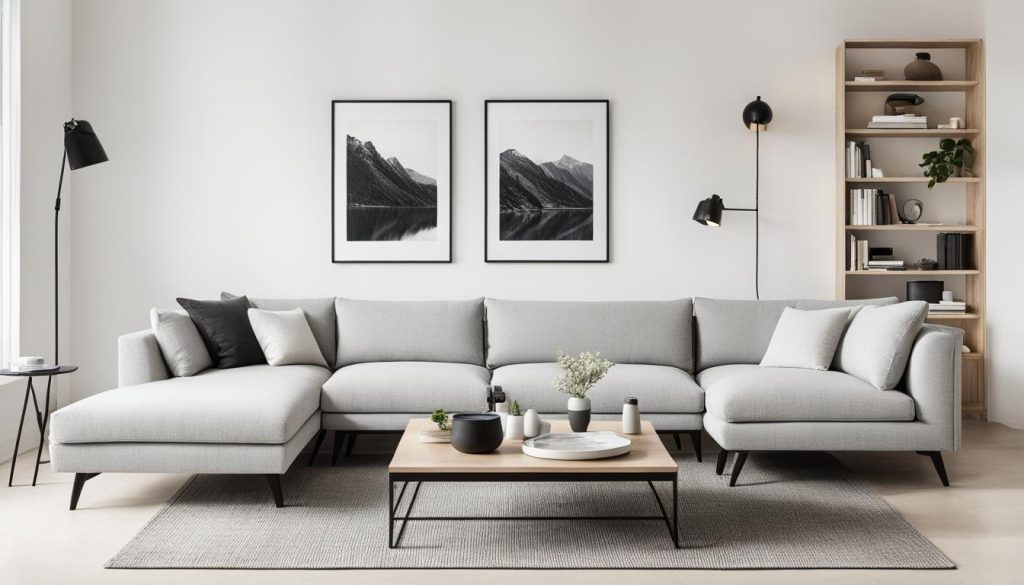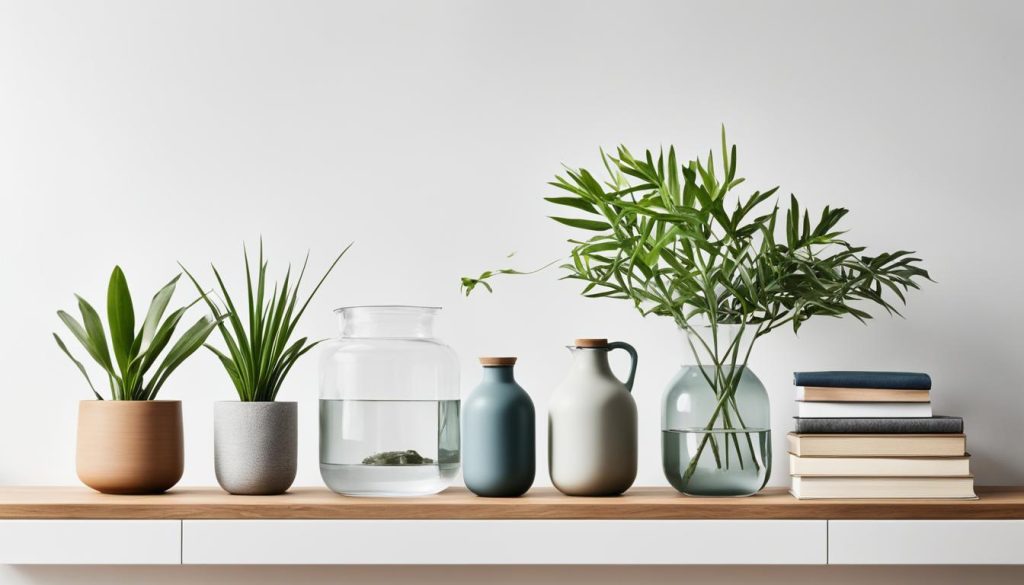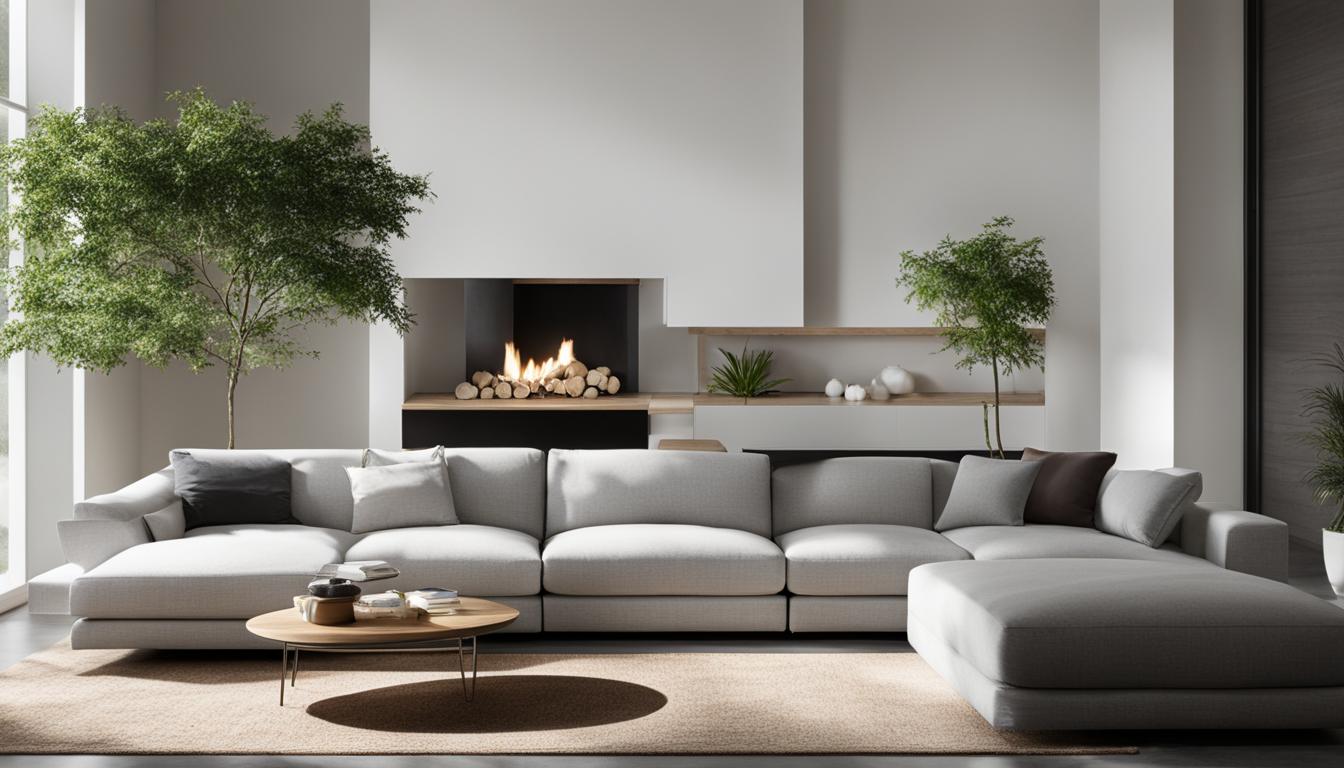Minimalist living is a lifestyle that I have personally embraced and found immense joy in. It revolves around the idea of living with less, decluttering our physical and mental spaces, and embracing simplicity and mindfulness. By eliminating excess belongings and distractions, we can create a more meaningful and intentional existence.
When we declutter our homes and let go of unnecessary possessions, we experience a sense of liberation and freedom. We are no longer weighed down by material possessions that don’t truly add value to our lives. Instead, we focus on what truly matters, cultivating a greater appreciation for the things that bring us joy and fulfillment.
Living a minimalist lifestyle encourages us to rethink our priorities and embrace a more mindful way of living. It allows us to simplify our lives, reducing stress and overwhelm. By stripping away the excess, we create space for mental clarity, creativity, and self-reflection. We become more intentional with our choices and cultivate a deep sense of gratitude for the present moment.
Key Takeaways:
- Minimalist living involves simplifying one’s space and possessions.
- Decluttering can bring about a sense of joy and serenity.
- A minimalist lifestyle promotes intentional living and focusing on what adds value.
- Minimalism has benefits such as stress reduction and increased mental well-being.
- Embracing minimalism can align with sustainable practices and have a positive impact on the environment.
The Benefits of Minimalist Living
Minimalist living offers numerous benefits that can greatly enhance our overall well-being. By embracing minimalism and decluttering our lives, we create a space that is not only organized and clutter-free but also promotes a sense of peace and tranquility. Let’s explore the various advantages of adopting a minimalist lifestyle:
Stress Reduction: One of the key benefits of minimalist living is the significant reduction in stress levels. Clutter and excess possessions can create visual and mental chaos, leading to feelings of overwhelm and anxiety. By simplifying our surroundings and eliminating unnecessary items, we create a serene and calming environment that promotes relaxation and stress reduction.
Increased Productivity: A clutter-free space can have a profound effect on our productivity. When we remove distractions and focus on what truly matters, we can accomplish tasks more efficiently and effectively. With a minimalist mindset, we prioritize our time and energy on activities that align with our goals and values, leading to increased productivity and a sense of accomplishment.
Improved Mental Well-being: Minimalist living has been shown to have a positive impact on mental well-being. By letting go of material possessions that no longer serve us, we free up mental space and create room for clarity and introspection. This allows us to prioritize our emotional and mental health, leading to greater self-awareness, contentment, and overall well-being.
Enhanced Financial Freedom: Minimalism can also lead to financial benefits. By adopting a minimalist lifestyle, we become more mindful of our spending habits and focus on intentional purchases rather than impulsive buying. This not only helps us save money but also enables us to invest in experiences and opportunities that bring us true joy and fulfillment.
Freedom and Clarity: Living a minimalist lifestyle grants us a sense of freedom and clarity. By letting go of excessive possessions and focusing on what truly matters, we free ourselves from the burden of materialism and the constant need for more. This newfound freedom allows us to live more authentically, make choices aligned with our values, and cultivate a greater sense of purpose and fulfillment.
“Minimalism is not about deprivation but rather about living a life of intention, where every possession and activity holds purpose and value.”
As we can see, adopting a minimalist lifestyle offers numerous benefits, from reducing stress and increasing productivity to improving mental well-being and achieving greater financial freedom. By simplifying our lives and embracing a clutter-free existence, we can experience a newfound sense of peace, freedom, and fulfillment.
| Benefits of Minimalist Living |
|---|
| Stress Reduction |
| Increased Productivity |
| Improved Mental Well-being |
| Enhanced Financial Freedom |
| Freedom and Clarity |

How to Embrace Minimalism
Embracing minimalism is a transformative journey that involves adopting specific strategies and making mindset shifts. By simplifying your life and embracing a minimalist lifestyle, you can experience greater clarity, freedom, and overall well-being. Here are some practical tips to help you get started:
1. Declutter Your Home
Begin your minimalist journey by decluttering your home. Take a thorough inventory of your belongings and get rid of items that no longer serve a purpose or bring you joy. Streamline your possessions and create a space that reflects simplicity and intentionality.
2. Prioritize Quality Over Quantity
Instead of focusing on accumulating more things, prioritize quality over quantity. Choose items that are built to last and bring genuine value to your life. Invest in pieces that align with your values and truly enhance your everyday experiences.
3. Focus on Experiences
In a minimalist lifestyle, experiences take precedence over material possessions. Shift your focus from accumulating things to creating memorable moments. Invest your time, energy, and resources in activities that bring joy, fulfillment, and personal growth.
4. Practice Mindful Consumerism
Adopt a mindful approach to your purchases. Before making a buying decision, ask yourself if the item aligns with your values and if it truly serves a purpose in your life. Avoid impulsive shopping and opt for sustainable, ethical, and locally sourced products when possible.
5. Simplify Your Schedule
Minimalism extends beyond physical decluttering; it also applies to your schedule and commitments. Learn to say no to activities and obligations that don’t align with your priorities or contribute to your well-being. Focus on the essential and create space for rest, self-care, and meaningful connections.
“The greatest step towards a life of simplicity is to learn to let go.”
6. Cultivate Mindfulness
Mindfulness is an essential aspect of embracing minimalism. Take time to reflect on your thoughts, emotions, and values. Practice meditation, journaling, or other mindfulness techniques to cultivate a deeper sense of self-awareness and gratitude.
7. Surround Yourself with Inspiration
Create an environment that inspires and supports your minimalist lifestyle. Surround yourself with visuals that resonate with simplicity and minimalism. Seek inspiration from minimalist influencers, blogs, books, and documentaries to stay motivated on your journey.
Remember, embracing minimalism is a personal process, and it’s important to find what works best for you. Start small and gradually incorporate minimalist practices into different aspects of your life. By simplifying and aligning your life with what truly matters, you can create a more intentional, fulfilling, and meaningful existence.

Minimalism and the Environment
Minimalist living goes hand in hand with sustainable practices, making a positive impact on the environment. By reducing consumption and waste, minimalists actively minimize their carbon footprint and contribute to a greener future. Embracing a minimalist lifestyle means prioritizing second-hand items, repurposing, and recycling, which all contribute to a more eco-friendly way of living.
Minimalism promotes conscious consumption, encouraging individuals to think twice before making purchases and consider the environmental impact of their choices. By embracing the use of renewable resources and avoiding unnecessary acquisitions, minimalists help create a sustainable cycle of consumption that reduces strain on the planet.
“The greatest threat to our planet is the belief that someone else will save it.” – Robert Swan
When minimalists prioritize quality over quantity, they opt for products that are made to last, reducing the need for replacements and preventing waste. Additionally, opting for minimalist lifestyles often involves prioritizing experiences over material possessions, leading to a reduced reliance on resource-intensive goods.
Benefits of Minimalism for the Environment:
- Reduced carbon footprint
- Encourages the use of renewable resources
- Minimizes waste and promotes recycling
- Prioritizes quality over quantity, reducing the need for replacements

In conclusion, minimalism and sustainable living go hand in hand. By reducing consumption, minimizing waste, and making conscious choices, minimalists contribute to a greener and more sustainable future for our planet.
Minimalism for Mental Well-being
Minimalist living is not only beneficial for creating a clutter-free space, but it also has a profound impact on our mental well-being. By embracing a minimalist mindset, we can experience increased mental clarity, reduced stress, and a greater sense of peace and contentment.
When we declutter our physical space, we simultaneously declutter our minds. The act of letting go of unnecessary possessions creates more mental space and reduces overwhelm. We no longer feel burdened by the weight of material possessions and can instead focus on what truly matters to us.
“Minimalism is not about deprivation, but rather about making room for what truly brings us joy and aligns with our values.”
Minimalism encourages introspection and self-reflection, allowing us to examine our priorities and let go of societal pressures and expectations. By questioning the need for excessive material possessions, we gain a deeper understanding of what truly adds value to our lives. We start to focus on experiences, relationships, and personal growth, rather than material accumulation.
The minimalist mindset promotes a sense of calm and tranquility. We free ourselves from the constant pursuit of acquiring more and shift our attention to the present moment. We learn to appreciate and savor the simple pleasures in life, finding joy in the little things.
By living in alignment with our values, we experience increased happiness and contentment. We no longer feel the need to compare ourselves to others or chase after material possessions for validation. Instead, we find fulfillment in living authentically and true to ourselves.
Embracing minimalism can lead to a greater sense of purpose. When we strip away the excess, we gain clarity on our goals and passions. We have the mental space to explore new interests, pursue meaningful activities, and make a positive impact on the world around us.
“Minimalism is about focusing on what truly matters, finding peace in simplicity, and living a life of intention.”
In summary, adopting a minimalist lifestyle has the potential to revolutionize our mental well-being. By decluttering our physical space and embracing a minimalist mindset, we can experience mental clarity, reduced stress, and a greater sense of purpose and contentment in life.
Minimalism and Financial Freedom
Minimalism is not only about decluttering and simplifying our physical space, but it can also have profound financial benefits. By embracing a minimalist lifestyle, individuals can achieve greater financial freedom and take control of their financial situation.
One of the key financial benefits of minimalism is the reduction of unnecessary expenses. When we adopt a minimalist mindset, we become more mindful of our spending habits and avoid impulse purchases. Instead of buying things on a whim, we prioritize our needs and only spend money on items that truly add value to our lives.
This shift in mindset leads to significant savings over time. By cutting back on non-essential expenses, minimalists create more financial resources that can be allocated towards their financial goals. Whether it’s building an emergency fund, paying off debt, or saving for retirement, minimalism provides the financial freedom to prioritize what truly matters.
Another advantage of minimalism is that it encourages conscious and intentional spending. Rather than seeking short-term satisfaction through material possessions, minimalists focus on experiences that bring lasting value. By prioritizing experiences over possessions, individuals can allocate their resources towards activities and events that create cherished memories and personal growth.
Budgeting also plays a crucial role in achieving financial freedom through minimalism. By tracking expenses and setting financial goals, minimalists gain a clear understanding of their financial situation and can make informed decisions about how to allocate their resources. Budgeting helps to ensure that money is being used in alignment with personal values and priorities.
I have found that by embracing minimalism and being intentional about my spending, I have been able to save more money and have a greater sense of financial security. It’s liberating to know that I am in control of my finances and can allocate my resources towards the things that truly matter to me.
By adopting a minimalist lifestyle and embracing its financial benefits, individuals can achieve greater financial freedom and peace of mind. The combination of mindful spending, intentional budgeting, and prioritizing experiences over material possessions sets the foundation for a secure and fulfilling financial future.
Tips for Embracing Minimalism in Everyday Life
Incorporating minimalist practices into everyday life can be a transformative journey towards a more intentional and fulfilling lifestyle. Here are some tips to help you embrace minimalism:
1. Start with Small Steps
Begin by decluttering one area at a time. This could be a drawer, a closet, or a room. Sort through your belongings and set aside items that no longer serve a purpose or bring you joy. Letting go of these unnecessary possessions will create space for what truly matters to you.
2. Practice the “One In, One Out” Rule
Adopting the “one in, one out” rule can help curb impulsive purchases and prevent accumulating clutter. Before buying something new, consider letting go of an old item that serves a similar purpose. This practice ensures that your belongings remain streamlined and intentional.
3. Simplify Your Schedule
Say no to activities and commitments that do not align with your priorities. Overcommitting can lead to stress and a sense of being overwhelmed. By simplifying your schedule and focusing on what truly matters, you create space for meaningful experiences and relationships.
4. Prioritize Self-Care and Mindfulness
Take time for self-care and incorporate mindful habits into your daily routine. This could include activities such as meditation, journaling, or engaging in hobbies that bring you joy. By prioritizing self-care, you nourish your well-being and cultivate a stronger connection with yourself.
“Minimalism is a tool to rid yourself of life’s excess in favor of focusing on what’s important—so you can find happiness, fulfillment, and freedom.” – The Minimalists
Remember that embracing minimalism is a personal journey, and it’s important to find what works best for you. These tips are a starting point to help you on your path towards a minimalist lifestyle. By simplifying your surroundings, schedule, and mindset, you can create a life that is intentionally designed to align with your values and bring you joy.
The Enduring Appeal of Minimalist Living
As more individuals strive for simplicity, mindfulness, and intentional living, the appeal of the minimalist lifestyle continues to grow. In a world overwhelmed by material possessions and constant distractions, minimalism offers a path to finding peace, focus, and fulfillment.
By embracing minimalism, individuals can reclaim their time and prioritize what truly matters in their lives. The minimalist lifestyle allows for a deliberate and conscious approach to daily routines and activities, helping to eliminate the unnecessary and create space for what brings genuine joy and meaning.
Minimalism also provides a sense of freedom, liberating individuals from the pressures of consumerism and the constant pursuit of more. By removing the excess and focusing on quality over quantity, minimalists find freedom in reducing the clutter and noise that often fills their lives.
As minimalism gains momentum as a worldwide trend, more and more people are discovering the joy and benefits of simplifying their lives. From freeing up time for meaningful experiences to fostering a deeper connection with the world around them, minimalist living offers a transformative approach that resonates with those seeking balance, fulfillment, and a sense of purpose.
FAQ
What is minimalist living?
Minimalist living is a lifestyle that focuses on simplifying one’s space and possessions, leading to a more mindful and meaningful existence. It involves decluttering and embracing simplicity, which can bring about a sense of joy and serenity.
What are the benefits of minimalist living?
Minimalist living offers numerous benefits, including stress reduction, increased productivity, and improved mental well-being. By removing clutter from our homes and lives, we create a more organized and peaceful environment. A minimalist lifestyle promotes intentional living, where individuals focus on what adds value to their lives and let go of what doesn’t.
How can I embrace minimalism?
Embracing minimalism involves adopting certain strategies and mindset shifts. Start by decluttering your home and getting rid of items that you no longer need or use. Streamline your possessions and only keep what you truly value and find essential. Focus on quality over quantity and prioritize experiences over material possessions.
What impact does minimalism have on the environment?
Minimalist living aligns with sustainable practices and can have a positive impact on the environment. By reducing consumption and waste, minimalists minimize their carbon footprint. They prioritize second-hand items, repurposing, and recycling, opting for a more eco-friendly lifestyle.
How does minimalism affect mental well-being?
Minimalist living has been linked to improved mental well-being. By decluttering our physical space, we create more mental space, reducing overwhelm and promoting a sense of calm. Minimalism encourages introspection and self-reflection, allowing us to focus on what truly matters and let go of societal pressures and expectations.
Can minimalism lead to financial freedom?
Yes, adopting a minimalist lifestyle can have financial benefits, allowing individuals to achieve greater financial freedom. By reducing unnecessary expenses and avoiding impulse purchases, minimalists can save money and have more resources to allocate towards their financial goals. Minimalism promotes mindful spending and encourages individuals to prioritize experiences that bring true value.
How can I incorporate minimalism into everyday life?
Incorporating minimalist practices into everyday life can be done through various strategies. Start by decluttering one area at a time, setting aside items that no longer serve a purpose. Practice a “one in, one out” rule when purchasing new items, ensuring that for every new item brought in, an old one is let go of. Simplify your schedule by saying no to activities and commitments that do not align with your priorities.
Why is minimalist living appealing to many people?
In a world saturated with material possessions and constant distractions, minimalist living offers a way to find peace, focus, and fulfillment. By embracing minimalism, individuals can reclaim their time, prioritize what truly matters, and find greater freedom in their lives. As the minimalist movement gains momentum, more people are discovering the joy and benefits of living with less.




